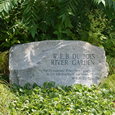 |
W.E.B. DU BOIS RIVER PARK
|
Rescue the Housatonic and clean it as we have never in all the years thought before of cleaning it… restore its ancient beauty; making it the center of a town, of a valley, and perhaps-who knows? of a new measure of civilized life.
–W.E.B. Du Bois, 1930 |
|
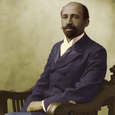 |
The Housatonic River by W.E. Du Bois, 1930
|
| Great Barrington “has turned its back upon the river,” W.E.B. Du Bois warned in a talk about the Housatonic River for the annual meeting of the alumni of Searles High School on July 21, 1930. The speaker commended the town for creating what is now Stanley Park near Cottage Street, but he “expressed the hope that upon his next visit to his native town he would see even greater improvements along the Housatonic.”
CLICK for text of speech, Berkshire Courier, July 31,1930. CLICK for draft of speech.
For this valley, the river must be the center. Certainly it is the physical center; perhaps, in a sense, the spiritual center. Perhaps from that very freeing of spirit will come other freedoms and inspirations and aspirations which may be steps toward the diffusion and diversification and enriching of culture throughout this land.
–W.E.B. Du Bois, 1930 |
|
 |
W.E.B. Du Bois River Park
|
| Were he to visit today, he would appreciate the community effort to transform a blighted section of riverbank into a public riverside greenway and to dedicate a riverside park in his name. The park, located at Church and River Streets, serves as an entrance to River Walk and is located a few paces from where Du Bois was born. It includes a rain garden where storm water from the street is collected and cleansed by wetland plants before making its way to the river.
CLICK to see examples of native plants that grow in the park. CLICK to see map.
River Walk volunteers are inspired by Du Bois’s special regard for the “golden river” near which he was born. Again in 1961, he wrote to Searles Alumni Association president George P. Fitzpatrick and admonished the town for failing to clean and restore the river to “a clear and limpid stream, flowing gently through grass, trees, and flowers, flanked by broad roadways and parks as the life stream of the town.”
“W.E.B. Du Bois 50 Sites in Great Barrington Guide” by Bernard A Drew, 2002, was prepared for the opening of the Du Bois River Park. See page 8 for “Du Bois & the Housatonic River Walk”. |
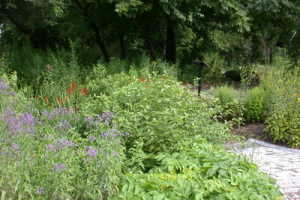 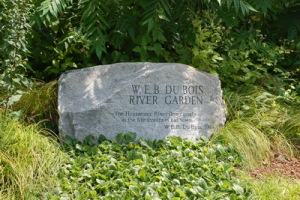 |
|
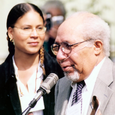 |
Dedication September 28, 2002
|
| The W.E.B. Du Bois River Garden Park was dedicated on Saturday, September 28, 2002, at First Congregational Church, Great Barrington, with Dr. David Graham Du Bois speaking. A special worship service at the Clinton African Methodist Episcopal Zion Church followed on Sunday, September 29, 2002, with Rev. Esther Dozier, Pastor, presiding.
CLICK for the full dedication proceedings. |
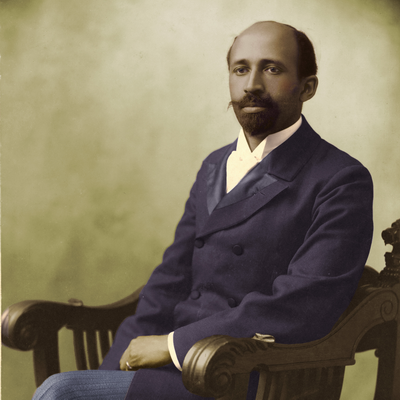 W.E.B. Du Bois, 1907 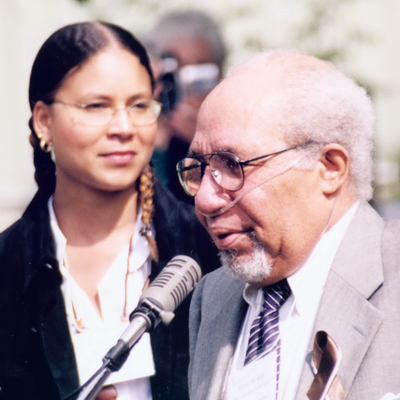 David Graham Du Bois, 2002
|
|
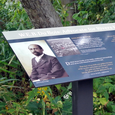 |
W.E.B. Du Bois: Champion of Rivers
|
| The permanent outdoor exhibit––W.E.B. Du Bois: Champion of Rivers Here at Home and Around the World––opened on September 8, 2012. In 2006, the River Park joined the Upper Housatonic Valley African American Heritage Trail.
CLICK to hear Harlem Renaissance poet Langston Hughes read “The Negro Speaks of Rivers,” which he composed when he was eighteen years old and Du Bois published in the July 1921 issue of The Crisis.

Click image for high resolution PDFs of complete exhibition
W.E.B. Du Bois: Born by a Golden River
Du Bois’s connection to rivers lends special meaning to his achievements in civil rights and social justice. His lifelong dedication to environmental justice and to rivers everywhere began when he was “born by a golden river,” as he declared, referring to the Housatonic River near his Great Barrington birthplace. His 1930 speech on the Housatonic River and his activism surrounding the Great Mississippi Flood of 1927 speak to his lifelong dedication to environmental justice and to rivers everywhere. On July 11, 2018, organizations throughout Berkshire County gathered at the Du Bois River Park to celebrate with readings and musical offerings. “Born by a Golden River” marked the first annual meeting on July 11, 1905, of Du Bois’s Niagara Movement Conference at Niagara Falls, which led to the founding of the N.A.A.C.P. in 1909. CLICK
W.E.B. Du Bois: I’ve Known Rivers
Community leaders gathered again on August 27, 2022, at the Du Bois River Park to honor Du Bois with readings and music. Water collected from the Housatonic River had been carried to Du Bois’s resting place in Accra. In exchange, water collected from Last Bath River in Accra was released into the “golden river” where Du Bois was born nearby. The riverside celebration —“I’ve Known Rivers”—took its name from Langston Hughes’s poem, “The Negro Speaks of Rivers,” first published by Du Bois in the June 1921 issue of The Crisis. Festivities took place on the anniversary of Du Bois’s passing in Accra, Ghana, on August 27, 1963, the eve of the seminal March on Washington for Jobs and Freedom. CLICK |
|










